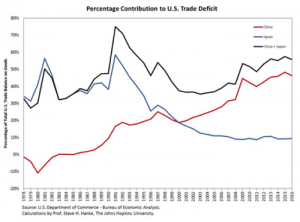Steve H. Hanke: Xi Should Coach Trump on How to Avoid a Trade War
2017-04-14 IMI Percentage Contribution to U.S. Trade Deficit
The U.S. savings deficiency has contributed to the hollowing out of American manufacturing. This is one subject which President Donald Trump has never mentioned. Instead, he claims that American manufacturing has been eaten alive by foreigners who adopt unfair trade practices and manipulate their currencies to artificially weak levels. This argument is nonsense.
To appreciate why President Trump — and many others in Washington, including Charles Schumer, the newly-elected Senate minority leader — are so misguided and dangerous, one should look to Japan. From the early 1970s until 1995, Japan was viewed as America’s economic enemy. The mercantilists in Washington asserted that unfair Japanese trading practices caused the trade deficit and destroyed U.S. manufacturing. Washington also asserted that, were the yen to appreciate against the dollar, America’s problems would be solved.
Washington even tried to convince Tokyo that an ever-appreciating yen would be good for Japan. Unfortunately, the Japanese caved into U.S. pressure, and the yen appreciated. The currency moved from 360 yen to the dollar in 1971 to 80 in 1995. This massive appreciation didn’t put a dent in Japan’s exports to the U.S., with Japan contributing more than any other country to the U.S. trade deficit until 2000.
In April 1995, Robert Rubin, then Treasury Secretary, belatedly realized that the yen’s overdone rise was driving the Japanese economy into a deflationary quagmire. In consequence, the U.S. stopped hounding the Japanese government about the value of the yen, and Rubin began to evoke his now-famous strong-dollar mantra. While this policy switch was welcome, it was too late for Japan.
Two decades later, China, rather than Japan, is America’s economic enemy. China-bashing is in vogue. Hardly a day goes by without Trump and other mercantilists railing against China, accusing it of unfair trade practices and currency manipulation. Let’s hope President Trump can refrain from repeating his wrongheaded ideas about trade to President Xi when they meet in Mar-a-Lago.
Let’s also hope that President Xi explains to Trump why his spending and tax policies will widen the gap between America’s spending and savings and result in a ballooning trade deficit. Xi should further explain that such a deficit should not be cause for a trade war with China. After all, the swelling trade gap is made in the U.S.A.
Percentage Contribution to U.S. Trade Deficit
The U.S. savings deficiency has contributed to the hollowing out of American manufacturing. This is one subject which President Donald Trump has never mentioned. Instead, he claims that American manufacturing has been eaten alive by foreigners who adopt unfair trade practices and manipulate their currencies to artificially weak levels. This argument is nonsense.
To appreciate why President Trump — and many others in Washington, including Charles Schumer, the newly-elected Senate minority leader — are so misguided and dangerous, one should look to Japan. From the early 1970s until 1995, Japan was viewed as America’s economic enemy. The mercantilists in Washington asserted that unfair Japanese trading practices caused the trade deficit and destroyed U.S. manufacturing. Washington also asserted that, were the yen to appreciate against the dollar, America’s problems would be solved.
Washington even tried to convince Tokyo that an ever-appreciating yen would be good for Japan. Unfortunately, the Japanese caved into U.S. pressure, and the yen appreciated. The currency moved from 360 yen to the dollar in 1971 to 80 in 1995. This massive appreciation didn’t put a dent in Japan’s exports to the U.S., with Japan contributing more than any other country to the U.S. trade deficit until 2000.
In April 1995, Robert Rubin, then Treasury Secretary, belatedly realized that the yen’s overdone rise was driving the Japanese economy into a deflationary quagmire. In consequence, the U.S. stopped hounding the Japanese government about the value of the yen, and Rubin began to evoke his now-famous strong-dollar mantra. While this policy switch was welcome, it was too late for Japan.
Two decades later, China, rather than Japan, is America’s economic enemy. China-bashing is in vogue. Hardly a day goes by without Trump and other mercantilists railing against China, accusing it of unfair trade practices and currency manipulation. Let’s hope President Trump can refrain from repeating his wrongheaded ideas about trade to President Xi when they meet in Mar-a-Lago.
Let’s also hope that President Xi explains to Trump why his spending and tax policies will widen the gap between America’s spending and savings and result in a ballooning trade deficit. Xi should further explain that such a deficit should not be cause for a trade war with China. After all, the swelling trade gap is made in the U.S.A.
